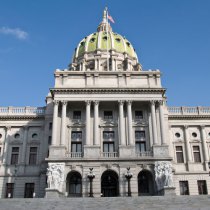Subscribe for Weekly Updates

New Report Provides Insights on Occupational Licensing
 By Alexandra Fabian, PICPA manager, government relations
By Alexandra Fabian, PICPA manager, government relations
The deregulation of certain licensing requirements has been a concern for the CPA profession. While the main focus of these efforts has not been on licensees such as CPAs, engineers, doctors, and lawyers, there is always a risk of collateral damage with the legislative process.
Legislators in 36 states have proposed about 130 licensing-related bills. Many hold the potential to reduce licensing requirements for highly technical professions, potentially putting the public at risk from inadequate or improper practice, says Marta Zaniewski, AICPA vice president of state regulatory and legislative affairs.
The Journal of Accountancy reported recently that, about six years ago, there was a surge in intensity in the desire of states to reassess occupational licensing. In 2015, the Obama administration issued a white paper that called on states to review occupational licenses that may be unnecessary and limiting worker mobility. That same year, the U.S. Supreme Court rendered a decision regarding an antitrust case in North Carolina that involved persons who performed teeth-whitening procedures on the public. The ruling created an opportunity for jurisdictions to closely examine the composition, function, and responsibilities of state licensing boards and the role professions play in the decision-making functions of regulatory boards.1
 In Pennsylvania, the PICPA has been active in the effort to protect the CPA designation and make sure the profession is not caught flatfooted if licensing legislation is brought up for a vote in the state House or Senate. On the national level, the Alliance for Responsible Professional Licensing (ARPL) is playing an important role in safeguarding this movement.
In Pennsylvania, the PICPA has been active in the effort to protect the CPA designation and make sure the profession is not caught flatfooted if licensing legislation is brought up for a vote in the state House or Senate. On the national level, the Alliance for Responsible Professional Licensing (ARPL) is playing an important role in safeguarding this movement.
Last session, the Pennsylvania General Assembly approved legislation to help Pennsylvanians with criminal records find meaningful jobs and to bolster Pennsylvania’s skilled workforce. Senate Bill 637, now Act 53 of 2020, ends the practice of blanket prohibitions on job licenses for certain criminal records and requires state licensing boards and commissions to apply a common set of rules when considering whether to deny, suspend, or revoke an occupational license on the basis of a criminal conviction.
Additionally, House Bill 1171, now Act 41, provides portability for professional licensees entering into Pennsylvania. This legislation affords certain professionals greater ease in obtaining a Pennsylvania license, reducing barriers to employment.
The PICPA provided feedback on these measures and worked with the prime sponsors of the bills to ensure these proposals would not cause unintentional harm to the CPA designation.
ARPL was founded to promote a responsible, balanced approach to professional licensing. It aims to educate policymakers and the public on the importance of high standards, rigorous education, and extensive experience with highly complex, technical professions that are relied upon to protect public safety and enhance public trust. It also offers best practices and solutions drawn from experience to serve as models for the public and members of a given profession.
Recently, ARPL commissioned Oxford Economics to produce the quantitative research study, Valuing Professional Licensing in the U.S., that explores the impact of professional licensing in highly complex, technical fields. The research found that 1 in 4 workers held a certificate or license in the United States in 2019. The report also found that, across all professions and occupations, licensing is associated with a 6.5% average increase in hourly earnings, even after accounting for the job holder’s educational attainment, gender, and racial demographics.
Among professionals in fields requiring significant education and training, a license narrows the gender-driven wage gap by about one-third and the race-driven wage gap by about half.
Minority engineers, surveyors, architects, landscape architects, and CPAs can expect an 8.1% hourly wage increase on average after becoming licensed in their field. Female engineers, surveyors, architects, landscape architects, and CPAs can expect a 6.1% hourly wage increase on average after becoming licensed in their field.
Both white professionals and male professionals were shown to benefit from licensing too, but to a lesser degree. White engineers, surveyors, architects, landscape architects, and CPAs can expect a 2.9% hourly wage increase after becoming licensed; and males in these professions can expect a 0.7% hourly wage increase after becoming licensed.
Those in trade and vocational occupations (e.g., barber, plumber, etc.) can expect a 7.1% hourly wage increase after becoming licensed, while those in a profession requiring advanced education and training (e.g., engineer, architect, etc.) can expect a 3.6% wage increase after becoming licensed.
The Valuing Professional Licensing in the U.S. report states that, on the one hand, licensing has the potential to protect the public against incompetent practitioners and create clear career paths for workers. It can also help consumers distinguish high- and low-quality providers. On the other hand, some have argued that licensure reduces employment in licensed occupations, and hence competition, thereby driving up the price of services.
The study provides an in-depth review of the impact of licensing on wages, and is an important resource for state CPA associations as they advise policy makers on this matter.
For more information about the research and ARPL’s mission, email info@responsiblelicensing.org.
1 George Spencer, "Value of Licensure Reaffirmed by New Research Report," Journal of Accountancy (Feb. 23, 2021).
Sign up for weekly professional and technical updates from PICPA's blogs, podcasts, and discussion board topics by completing this form.







Leave a commentOrder by
Newest on top Oldest on top